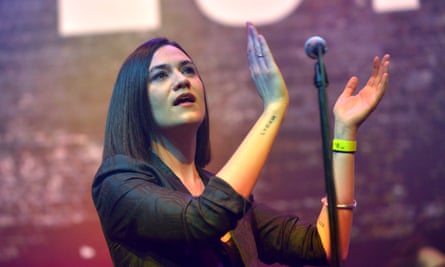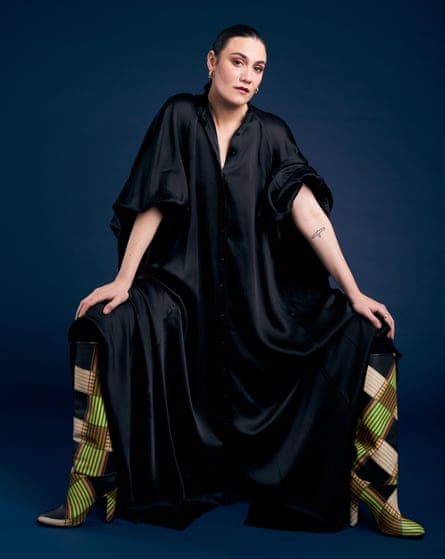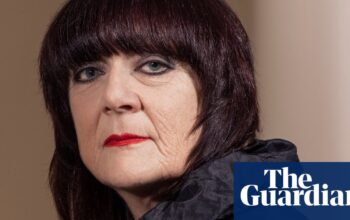W
Within three minutes of meeting Nadine Shah, she is attempting to persuade me, and anyone who may be reading this, to buy her house on the Kent coast that she still lives in with her ex-husband. She jokes that since no one wants to buy it, she will use this article to showcase how great Ramsgate is.
Shah is a singular force in British rock, as funny and charismatic in person as she is on stage and in song. The Tyneside songwriter’s atmospheric, tragicomedic post-punk songs tackle tough themes with an acid tongue, and find absurdity in bleakness: her 2017 Mercury prize-nominated album Holiday Destination had songs about the Syrian refugee crisis and Islamophobia. The follow-up, Kitchen Sink, sent up the sexism she has experienced as a woman in her 30s, and depicted men selecting mistresses as if they were livestock.
Following the release of her first album, Love Your Dum and Mad, in 2013, which was written in response to the passing of two former boyfriends, Shah took on the role of ambassador for the mental health charity Calm. She has been vocal about important issues within the music industry, including the gender pay gap and the inequity of streaming for musicians. She has also spoken out against the discrimination she has faced due to her Muslim surname, as her father is of Pakistani descent. Currently, she is enjoying a cup of tea at a London bar and remains humble about her actions: “In the past, some may have seen me as self-righteous for speaking out about refugee rights, and now they may think the same as I address streaming issues. But I am just doing what I believe is right.”
But Shah is extremely likable; unfiltered and a champion of what she believes in, including the ever-dwindling music press. While plenty of musicians are suspicious of critics, in lockdown she created an Instagram Live series called Payback, where she interviewed music journalists about their jobs. “We’re losing all our best writers because no one’s getting paid for it,” she says.
The house sale marks the end of a tumultuous period in her life. In 2018, Shah left London to go home to Whitburn, South Tyneside, when her mother Heather was diagnosed with stage 4 lung cancer. “I dropped everything,” she says.
Heather’s life expectancy was originally estimated to be a short few years, but according to Shah, the pandemic accelerated her decline even further. Due to being high-risk, she was unable to leave her home which caused her mental health to worsen and consequently had a negative impact on her physical health. During this difficult time, Shah turned to writing Kitchen Sink while caring for her mother. She reflects, “It was a terrible time. I was taking care of the most important person in my life and watching her pass away, and I turned to substance abuse.”
In June of 2020, Kitchen Sink was released, but just two months later, her mother passed away. Due to lockdowns, Shah’s job opportunities were limited and her substance abuse became more severe. She chooses not to disclose the specifics of her actions or the drugs she was using, as she believes they are often romanticized. Shortly after, she relocated to Ramsgate to reside with her boyfriend, a former colleague who had previously directed one of her music videos. As her addiction and mental health struggles worsened, they got married in the summer of 2021.
“I was trying to maintain a facade of normalcy while feeling extremely unstable, going at full speed of 110 miles per hour,” she recalls. “I was in poor health on the day of the wedding and barely appeared in any photos. And the situation continued.”
Shah began experiencing hallucinations over time. He became aware that he was losing control of his thoughts and it was a frightening experience. He also isolated himself and went two weeks without leaving the house, while using a lot of substances.

Display the image in full screen mode.
Her companions have informed her that it was similar to witnessing a fast-moving train on the verge of derailing. “As my husband and I grew farther apart in our relationship, it became increasingly challenging for him to be around someone who was so unwell,” Shah explains. “My dearest friends and family tried their best, but there was nothing anyone could do to help. In 2022, I ultimately made the decision to end my own life.”
In the month of April in that particular year, Shah posted a message on Twitter that caused concern among her followers. Shah explains, “I was in poor health and afraid of losing my sanity. I doubted that I would ever fully regain my mental abilities.”
Shah’s feline caregiver hurried over to her residence. Eventually, the vocalist decided to enter a rehabilitation program. She later realized that it was the most beneficial decision she had made. Initially, she was scared, but upon arrival, she no longer had to put up a facade. It was a moment of immense relief.
She is currently working on a memoir that chronicles her experience in rehabilitation. This is an important subject for her to write about, as there are very few accounts of it from a woman’s perspective. She shares, “I felt ashamed of being in rehab. There is a stigma attached to being a woman and an addict, whereas male musicians may have been celebrated for it.” I bring up the example of Amy Winehouse, whom Shah knew briefly. “Unfortunately, she faced terrible ridicule,” says Shah, “but it’s important to remember that she was struggling with illness.”
Shah describes her experience of rehab as “beautiful”. “I don’t think I’ve ever laughed so much in my life as I did in that place,” she says. They had a sports day: “I won every race. People there were so ill they could hardly walk, never mind run.”
Taking a break from social media was a freeing experience. According to the person, not constantly checking their own name was refreshing. They spent time playing games and doing Zumba, and even picked up a new skill of lockpicking. Apparently, there are many individuals with criminal tendencies on the platform.
However, several of the individuals she became friends with during her time in rehab have passed away. She honors them on her track, Twenty Things, stating, “I never expected to develop such strong bonds with everyone.”

After completing her rehabilitation, she felt stronger. She admitted, “In the past, I wouldn’t have been able to handle interviews or performances without a drink.” She also realized how challenging it was for her to navigate the entertainment industry as an introverted and anxious person. As a result, she has developed a thicker skin. Though her marriage has ended, she maintains a friendly relationship with her ex-partner. She explained, “I don’t let the little things bother me. I think that’s what happens when you come close to death. Many things that used to upset me no longer do. I have no problem with receiving criticism online.”
After leaving, her initial action was to resume her work. Prior to September 2022, she had never performed on stage, but she took on the role of Titania in a lively and unstructured production of A Midsummer Night’s Dream at Shakespeare North Playhouse. She thoroughly enjoyed the playful nature of her character and received a nomination for the What’sOnStage awards.
Additionally, her fifth album, crafted with a whimsical tone, has been completed. Filthy Underneath serves as a reflection of Shah’s descent and subsequent recovery, all set to a flawless beat. While it expands on the sound of Kitchen Sink, some tracks possess a more carefree rhythm reminiscent of the Burundi beat popularized by 80s new wave band Bow Wow Wow and the darkly exotic style of Siouxsie Sioux’s side project, the Creatures. Other songs are infused with 70s influences, including the Turkish psychedelic sound of protest singer Selda Bağcan and the seductive cosmic disco of Indian siren Asha Puthli.
The melodies are adventurous, and the contradictions of Shah’s inner psyche loom large, as she confronts her shadow self and ego, and laments the end of her marriage. If that sounds a bit like therapy-speak, lead single Topless Mother takes sardonic aim at some uncomfortable counselling sessions she had during recovery. Its delirious word association (one example: “Sharia, Diana, samosa”) comes off like a playground taunt, as she appears to flip between herself and the voice of her therapist.
Shah fully utilizes her vocal range, incorporating weightless falsetto and a qawwali-inspired trill in the serpentine track “Food for Fuel.” Despite previously holding back in order to be perceived as more serious, she now embraces her powerful voice.
Rephrased: Stellar usage is evident in “Greatest Dancer,” a bold goth track that draws inspiration from the time she ingested some of her mother’s prescribed medication while watching an episode of “Strictly Come Dancing.” Another notable track is “Keeping Score,” a synthpop ballad with operatic elements that seems tailor-made for her current supporting performances for Depeche Mode in large arenas. The latter song revisits a recurring theme in her music, toxic relationships, but the topic remains emotionally charged. She admits, “I have yet to find the words to discuss that one. It delves into the issue of male violence against women, whether it be verbal or physical.”
Initially, she had doubts about being able to continue this as a profession. However, her mother instilled in her a love for music, particularly Scott Walker, and it serves as a way to stay connected to her: “I am holding the note for her,” as she expresses in the poignant song, See My Girl. “I couldn’t let go of music because it brings me back to my mother,” she explains. “I will always have that bond with her.”
One notable aspect is the powerful spoken-word sermon by Sad Lads Anonymous, which portrays a cringe-worthy depiction of hitting rock bottom. The creator explains, “I am describing being at an awards ceremony, abandoned by my band, and confiding in a work experience student in a bathroom stall about my darkest secrets.” She reflects, “Looking back on it all, I can now laugh about a lot of it, but many of the foolish things I did were humiliating.” When making Filthy Underneath, Shah questioned, “Is this too personal? Am I revealing too much? But I lost my sense of mystery as an artist a long time ago. I cannot regain that, so I might as well create brutally honest work.”
The final song, “French Exit,” is brutally honest and has a darkly humorous tone as it describes “sliding off the dancefloor” of life. Initially, the artist was hesitant to share this song about suicide with her music partner Ben Hillier. However, she now associates the song with a different image – using the instrumental in a performance of A Midsummer Night’s Dream, where she had a sexual dance with a donkey.
Shah has a desire to perform more concerts, particularly internationally. Her recent performances showcased a more unrestrained and relaxed artist, fully embracing the dramatic elements of her new music. Before diving into her upcoming tour, she is eagerly anticipating her first trip to Los Angeles. During her visit, she plans to pay respects to her friend Mark Lanegan at the Hollywood Forever Cemetery.
Currently, Shah is not using any substances, but she acknowledges that addiction is something that can never be completely ruled out. Despite this, she is actively involved in Vinted, a platform for secondhand clothing. She even convinced her manager to join, admitting that she is enabling others to use the site as well.
She has utilized the application to discover various garments, including the black PVC catsuit featured on Filthy Underneath’s cover and the Suspiria-inspired red dress by punk designer Pam Hogg in the Topless Mother music video. In the video, she tears apart numerous feather pillows from a homeware department. “I am thoroughly enjoying myself this time,” she remarks about her persistent and inventive destruction of bedding. “I am unsure of how long this phase will continue, so I am making the most of it.”
The album “Filthy Underneath” will be available on February 23rd through EMI North.
In the United Kingdom and Ireland, individuals can reach out to Samaritans by dialing 116 123 for free, or by emailing [email protected] or [email protected]. In the United States, the National Suicide Prevention Lifeline can be contacted by calling or texting 988, chatting on 988lifeline.org, or texting HOME to 741741 to connect with a crisis counselor. In Australia, the crisis support service Lifeline can be reached at 13 11 14. For additional international helplines, please visit befrienders.org.
Source: theguardian.com


